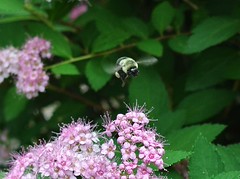Now that it’s June, the backyard is deepening into its summer hues. As I type this, a lone cottontail is hopping around the backyard, darting in and out of the irises and spiderwort. Earlier, I saw two cottontails side by side, intermittently eating and chasing one another: signs that we’ll have even more cottontails. In June, everything seems geared to continuance, rebirth, and renewal: the idea that things roll on.
In June, summer lures you into thinking that what you’re experiencing now will somehow last, that the sun will shine this way for ever. This time of year lulls us into trust and complacency, with the trials of winter seeming very far away. Who in June really believes that summer will ever end? The whole point of June is to relax and slip into trusting complacency and the languid assumption that the sun will continue to shine and the grass will continue to grow green.
At the beginning of A Week on the Concord and Merrimack Rivers, Thoreau lifts a line from the treaties Europeans made with Native Americans, in which their agreement was promised to last as long as rivers flow and grasses grow. We know from history that European treaties with Native Americans never lasted long; apparently rivers don’t flow forever nor does grass grow long. As poetic as this promise might sound, it is (after all) misleading. Rivers flow and grasses grow for only a season: in winter, rivers freeze and grasses die. The phrasing of these treaties, in other words, is strictly seasonal, an eternally ephemeral thing. Summertime treaties are couched in optimism, the season we make undying promises despite the fact that everything eventually ends.
But it’s difficult to believe that in June: difficult to believe that the next crop of baby cottontails, still a sparkle in their parents’ brown, goat-like eyes, will someday themselves die. As I type these words on a hot June day, my bare feet browned from the sun, it’s difficult to believe that I too, eventually, will die.
In June, the Buddha’s teachings about suffering and impermanence seem misguided and even cruel: who would be heartless enough to ruin a day at the beach—nasty enough to rain on someone’s parade—by reminding them at the height of summer that these days don’t last? In summer, the days like sunlight stretch and linger long: these are the days we wish would never end because we don’t actually believe they can. June is the season of immortality, when nature pumps out life and humans make promises and plans as if there were no tomorrow: is it any accident that so many couples get married in June? In June, we dance and fiddle like grasshoppers, unable to conceive (in the midst of so much conception) that these happy days could ever end.
The secret to summer sweetness, however, is to cherish these days as precious: that is the intention behind the Buddha’s words. Buddha never intended to rain on anyone’s parade with his insistence that things are impermanent; instead, he wanted to remind us that parades are a passing thing. Don’t be fooled by a seemingly endless array of floats and bands and marchers, for this too finishes in finale. Keep your eyes open at every instant because every parade—and every parade watcher—eventually marches away.






Jun 26, 2013 at 1:52 am
I wonder if the colonists MEANT that phrase about rivers and grasses in the seasonal sense when they wrote those treaties?
All things must pass!
LikeLike
Jun 26, 2013 at 1:58 am
This article sounds perfectly believable. I’ve always wondered about the abundance of summer; how could nature be so wasteful and still so right?
LikeLike
Jun 29, 2013 at 8:10 am
Yesterday I went to the funeral of a women who died at age 99, two months shy of her 100th birthday. That’s about as long as anyone gets. The cemetery was lush green, full of robins, squirrels and rabbits.
LikeLike
Jun 29, 2013 at 10:47 pm
This weekend I spent time with my father – hours over one breakfast of bacon and eggs, and twice watching him water ski, slalom, with a strength and skill I never came close to achieving. In amongst all of that, we sat with my step sisters while they wept and sometimes laughed as they reviewed with us the hours they are spending with _their_ father who is very suddenly and very rapidly dying of cancer. Eyes open, indeed.
LikeLike